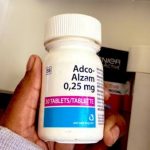Auscap: Uses, How it Works, Dosage, Side effects

Auscap is a generic brand of fluoxetine, an antidepressant medication that has been widely prescribed for the treatment of various mental health conditions, including depression, anxiety, obsessive-compulsive disorder, and bulimia nervosa. It is a selective serotonin reuptake inhibitor (SSRI), which means that it works by increasing the levels of serotonin in the brain. Serotonin is a neurotransmitter that plays a crucial role in regulating mood, appetite, and sleep. In this blog post, we will take an in-depth look at fluoxetine, including its uses, side effects, mechanism of action, and more.
Although Auscap Not is approved by many drug regulatory agencies, there are several other approved generic brands of fluoxetine for the treatment of major depressive disorder, OCD, bulimia nervosa, and panic disorder. It may also be prescribed off-label for other conditions, such as generalized anxiety disorder, social anxiety disorder, premenstrual dysphoric disorder, and post-traumatic stress disorder. Auscap is available in 10 mg, 20 mg, and 40 mg strengths.
Depression
Auscap is widely used to treat depression. It is effective in treating both major depressive disorder and dysthymia, which is a milder form of depression. In a clinical trial involving patients with major depressive disorder, Auscap was found to be more effective than a placebo in reducing symptoms of depression. It was also found to be well-tolerated by patients, with few adverse effects.
OCD
Auscap is also effective in treating OCD, a condition characterized by recurrent, intrusive thoughts (obsessions) and repetitive behaviors (compulsions). In a clinical trial involving patients with OCD, Auscap was found to be more effective than a placebo in reducing symptoms of OCD. It was also found to be well-tolerated by patients, with few adverse effects.
Bulimia nervosa
Auscap is also used for the treatment of bulimia nervosa, a condition characterized by recurrent episodes of binge eating followed by purging. In a clinical trial involving patients with bulimia nervosa, Auscap was found to be more effective than a placebo in reducing the frequency of binge eating and purging episodes. It was also found to be well-tolerated by patients, with few adverse effects.
Panic disorder
In many countries, Auscap is also approved for the treatment of panic disorder, a condition characterized by recurrent panic attacks. In a clinical trial involving patients with panic disorder, Auscap was found to be more effective than a placebo in reducing the frequency and severity of panic attacks. It was also found to be well-tolerated by patients, with few adverse effects.
How Auscap works
Auscap works by selectively inhibiting the reuptake of serotonin, a neurotransmitter that plays a crucial role in regulating mood, appetite, and sleep. By inhibiting the reuptake of serotonin, Auscap increases the levels of serotonin in the brain, which helps to alleviate symptoms of depression, anxiety, and other mental health conditions.
How to take Auscap
All possible dosages may not be included here. Your dosage, drug form, and how often you take the drug will depend on:
• the condition being treated
• your age
• how severe your condition is
• other medical conditions you have
• how you react to the first dose
| Condition | Starting dosage of Auscap | Maximum dosage of Auscap |
| panic disorder | 10 mg per day | 60 mg per day |
| obsessive-compulsive disorder (OCD) | 20 mg per day | 80 mg per day |
| depression | 20 mg per day | 80 mg per day |
| treatment-resistant depression* | 20 mg per day | 50 mg per day |
| depression related to bipolar I disorder* | 20 mg per day | 50 mg per day |
| bulimia nervosa (an eating disorder) | 60 mg per day† | 60 mg per day |
Side effects
Like all medications, Auscap can cause side effects. Common side effects include:
- Nausea
- Insomnia
- Headache
- Dry mouth
- Dizziness
- Fatigue
These side effects are usually mild and go away on their own within a few days or weeks of starting treatment. However, if they persist or become bothersome, it is important to talk to your healthcare provider.
In rare cases, Auscap can cause more serious side effects, such as:
- Suicidal thoughts or behaviors
- Serotonin syndrome (a potentially life-threatening condition characterized by agitation, confusion, rapid heart rate, high blood pressure, muscle rigidity, and fever)
- Seizures
- Allergic reactions
If you experience any of these side effects, it is important to seek medical attention immediately.
Addiction
While it is not typically considered to be addictive in the same way as drugs of abuse like opioids or stimulants, it is possible for some individuals to develop a dependence on Auscap.
Dependence on Auscap can occur when the body becomes accustomed to the presence of the drug and requires it to function normally. This can lead to withdrawal symptoms if the drug is stopped abruptly or the dose is significantly reduced. Withdrawal symptoms from Auscap can include anxiety, irritability, dizziness, nausea, and insomnia.
It is important to note that dependence on Auscap is different from addiction. Addiction involves compulsive drug seeking and use despite negative consequences, while dependence is a physiological response to the drug. However, some individuals with a history of substance abuse or addiction may be at a higher risk for developing dependence on Auscap.
Interactions
It is important to be aware of potential drug interactions when taking Auscap, as these can affect the safety and effectiveness of the medication.
Here are some of the common interactions associated with Auscap:
1. Monoamine oxidase inhibitors (MAOIs): Taking Auscap with MAOIs can cause a serious and potentially life-threatening condition called serotonin syndrome. MAOIs should not be taken within 14 days of stopping Auscap.
2. Other SSRIs and SNRIs: Taking Auscap with other SSRIs or SNRIs can increase the risk of serotonin syndrome.
3. Tricyclic antidepressants: Auscap can increase the levels of tricyclic antidepressants in the body, which can lead to side effects such as dry mouth, constipation, and confusion.
4. Warfarin and other blood thinners: Auscap can increase the risk of bleeding when taken with warfarin and other blood thinners.
5. Nonsteroidal anti-inflammatory drugs (NSAIDs): Taking Auscap with NSAIDs can increase the risk of bleeding.
6. St. John’s Wort: St. John’s Wort can reduce the effectiveness of Auscap and increase the risk of side effects.
It is important to inform your doctor and pharmacist about all medications and supplements you are taking before starting Auscap. They can help you identify potential interactions and adjust your medications as needed.
Conclusion
Auscap is an effective antidepressant medication that has been widely prescribed for the treatment of various mental health conditions, including depression, anxiety, OCD, and bulimia nervosa. It works by selectively inhibiting the reuptake of serotonin, a neurotransmitter that plays a crucial role in regulating mood, appetite, and sleep.
Auscap is generally well-tolerated by patients, with few adverse effects. Common side effects include nausea, insomnia, headache, dry mouth, and dizziness. In rare cases, it can cause more serious side effects such as suicidal thoughts or behaviors, serotonin syndrome, seizures, and allergic reactions.
If you are considering taking Auscap or any other antidepressant medication, it is important to talk to your healthcare provider about your options. They can help you decide which medication is right for you and provide guidance on how to take it safely and effectively. It is also important to follow their instructions carefully and to report any side effects or concerns that you may have.
In addition to medication, other treatments for mental health conditions may include therapy, lifestyle changes, and support from family and friends. It is important to take a holistic approach to your mental health and to seek help when you need it.
In conclusion, Auscap is an effective antidepressant medication that can help alleviate symptoms of depression, anxiety, and other mental health conditions. While it may cause side effects in some patients, these are usually mild and go away on their own. If you are considering taking Auscap, talk to your healthcare provider to determine if it is right for you. Remember, there is no shame in seeking help for your mental health, and there are many resources available to support you on your journey to wellness.





